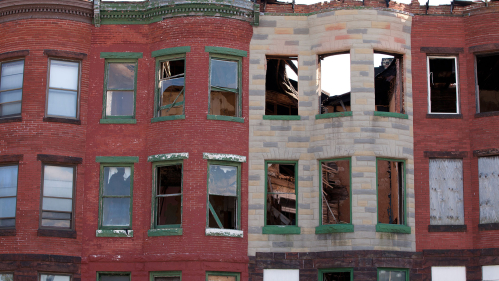Neighborhood Stress Can Heighten Levels of Maternal Sex Hormones During Pregnancy

Pregnant women living in blighted neighborhoods with high levels of known stressors have higher levels of testosterone – the primary sex hormone in males -- which disrupt hormone regulation and may lead to life-threatening complications during and after childbirth, according to Rutgers research.
“Previous research has shown that exposure to neighborhood stressors is associated with preterm birth, low birth weight and other complications such as preeclampsia, gestational diabetes and stillbirth,” said Zorimar Rivera Núñez, an assistant professor of epidemiology at the Rutgers School of Public Health and a senior author of the study published in BMC Pregnancy and Childbirth.
“The purpose of this study was to look at possible mechanisms between neighborhood stressors and pregnancy health, and we looked at sex steroid hormones because they’re critically important for both fetal development and maternal health,” Rivera-Núñez said.
Researchers analyzed data from 262 pregnant women who completed a questionnaire about their neighborhoods and underwent blood tests that measured sex hormones such as testosterone in each trimester.
The researchers found that women living in neighborhoods with stressors such as vacant lots, derelict buildings and other signs of disorder had significantly higher levels of testosterone – nearly 40 percent higher by the third trimester of pregnancy – than women living in well-ordered neighborhoods.
Testosterone is known to play a role in a variety of pregnancy-related processes, including sexual differentiation of the brain during early development.
Megan Hansel, first author and doctoral student at the Rutgers School of Public Health, said their findings suggest interventions to reduce neighborhood stress, such as improving access to green spaces and community resources, could help to improve pregnancy outcomes for all pregnant people.
In addition to the potential physical health risks for pregnant people and their babies, neighborhood stress also can harm maternal mental health, previous studies show. Pregnant people living in stressful neighborhoods are more likely to experience anxiety, depression and other mental health problems. These mental health problems also can hurt pregnancy outcomes.
Data for the study come from the Understanding Pregnancy Signals and Infant Development (UPSIDE) cohort, which collected biospecimens, questionnaires and medical record data from 262 women living in and around Rochester, N.Y. Researchers measured the sex hormones maternal serum total testosterone, free testosterone, estrone, estradiol and estriol in each trimester and surveyed participants about neighborhood stressors. UPSIDE is part of the NIH program Environmental Influences on Child Health Outcomes (ECHO), the largest study on child health in the U.S.
The new analysis of UPSIDE data found that 73 percent of women in the cohort reported exposure to one or more types of neighborhood disorder, while 22 percent reported any exposure to violence.
In adjusted models, neighborhood disorder was associated with higher testosterone across pregnancy, with the strongest associations observed in the third trimester, where neighborhood disorder was associated with an average testosterone elevation of 38 percent. The effect was more pronounced in women carrying male rather than female fetuses.
Exposure to violence wasn’t associated with any hormones.
“The findings suggest that stress may alter prenatal testosterone levels, which could explain some of the adverse outcomes we find when pregnant people live with neighborhood stressors,” Rivera Núñez said. “But more research is needed to prove a causal link.”


